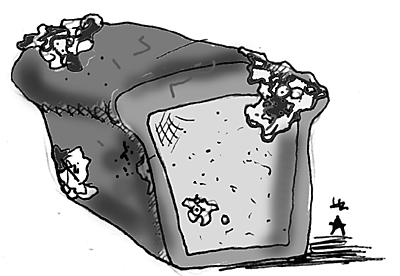


|

Illustration by Holly Randall
|
|
Arizona Daily Wildcat
Friday, March 25, 2005
Print this
Alexander the Great spared one house after he captured Thebes in 335 B.C. The city had refused to surrender, and he ordered it to be razed to the ground. Because he loved poetry, he spared the house in which Pindar the poet had lived more than a century before.
Spartan youngsters were taught to be terse in speech. They were supposed to act rather than to talk - the less said, the better. The district surrounding the city of Sparta (and the first area Sparta came to dominate) was named Laconia. To be terse in speech, therefore, is to be laconic.
The name "Inca" originally did not refer to a race or to a nation of people. When Francisco Pizarro landed in South America in 1532, "the Inca" meant "king" or "ruler," and by extension one of his ancestors or relatives.
Up until 1965, the U.S. dollar, half dollar, quarter and dime were made with gold and silver. These coins were ridged to make it difficult for people to file down the sides of these coins for the precious metals within, and retained these ridges after 1965. Pennies and nickels were never made with precious metals, so they were never made with ridges.
Not all the bad guys in Harriet Beecher Stowe's mild abolitionist tract about U.S. slavery, "Uncle Tom's Cabin," are Southerners. The villains are Northern renegades. Simon Legree, the wicked slave driver, was from Vermont.
"I'm sorry, Mr. Kipling, but you just don't know how to use the English language. This isn't a kindergarten for amateur writers." And thus, Rudyard Kipling - who had already written one of the best short stories in the history of literature, "The Man Who Would Be King" - was fired as a reporter by the San Francisco Examiner.
The use of antibiotics did not begin in this century; early folk medicine included the use of moldy foods or soil for infections. In ancient Egypt, for example, infections were treated with moldy bread.
Write a Letter to the Editor
|
|

|
